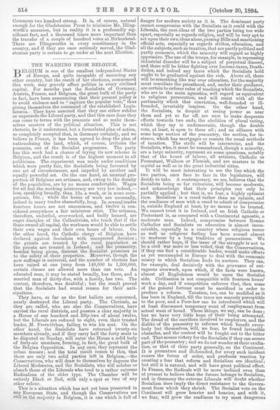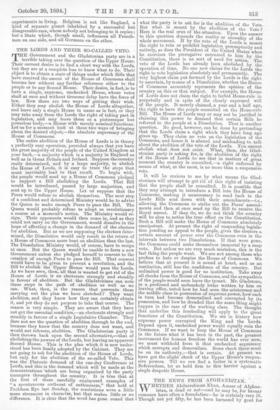THEWARNING FROM BELGIUM. B ELGIUM is one of the smallest independent
States of Europe, and quite incapable of menacing any other country, but the result of her elections, commenced this week, may gravely affect politics in every civilised capital. For months past the Socialists of Germany, Austria' France, and Belgium, the great bulk of the party in fact, have been announcing that their present policy is to avoid violence and to " capture the popular vote," thus giving themselves the command of the established Legis- latures. They have asserted that they can either subdue or supersede the Liberal party, and that this once done they can come to terms with the peasants and so make them- selves masters of the political situation. This is not rhetoric, be it understood, but a formulated plan of action, so completely accepted that, in Germany certainly, and we believe in France, it has been agreed to drop the plan of nationalising the land, which, of course, irritates the peasants, out of the Socialist programme. The party has this week had. a chance of trying its new scheme in Belgium, and the result is of the highest moment to all politicians. The experiment was made under conditions which were pretty fair, the Socialists being favoured by one set of circumstances, and impeded by another and equally powerful set. On the one hand, an unusual pro- portion of Belgians are artisans, and, owing to the density of the population, are by no means comfortable. Wages for all but the working aristocracy are very low indeed,— less, speaking broadly, than 12s. a week, or in some occu- pations, 10s. ; while the hours of work are unusually, indeed in many trades shamefully, long. In several trades fourteen hours are not uncommon, and twelve is con- sidered everywhere a fair minimum stint. The artisans, therefore, underfed, overworked, and badly housed, are eager disciples of the Collectivists, who teach that if the State owned all capital, the workmen would be able to settle their own wages and their own hours of labour. On the other hand, the Catholic clergy of Belgium have declared against Socialism with unexpected decision ; the priests are trusted, by the rural population as the priests are trusted in Ireland ; and the peasantry, besides being pious, distrust the Socialist promises as to the safety of their properties. Moreover, though the new suffrage is universal, and the number of electors has been raised at one jump from 140,000 to 1,200,000, certain classes are allowed more than one vote. An edacated man, it may be stated broadly, has three, and a married man of thirty-five, with a family, has two. The contest, therefore, was doubtful; but the result proved that the Socialists had sound reason for their anti- cipations. They have, so far as the first ballots are concerned, nearly destroyed the Liberal party. The Clericals, as they are called, who are also the Conservatives, have carried the rural districts, and possess a clear majority in a House of one hundred and fifty-two of about twelve, but the Liberals are reduced to eight, even their trusted leader, M. Frere-Orban, failing to win his seat. On the other hand, the Socialists have returned twenty-six members already, and if they carry half the forty seats to be disputed on Sunday, will enter the House a solid body of forty-six members, forming, in fact, the great bulk of the Belgian Opposition. In any case, they represent the urban masses ; and the total result comes to this, that there are only two solid parties left in Belgium,—the Conservatives, who will draw to themselves by degrees the Liberal Moderates, and the Socialists, who will subdue or absorb those of the Liberals who tend to a rather extreme Radicalism of the older type. The Chamber will be entirely Black or Red, with only a spot or two of any other colour, This is a situation which has not yet been presented in any European State, and though the Conservatives are still in the majority in Belgium, it is one which is full of danger for modern society as it is. The dominant party cannot compromise with the Socialists as it could with the Liberals, the root-ideas of the two parties being too wide apart, especially as regards religion, and will be very apt to act upon their own ideas alone, passing Bills and sanctioning official acts, especially as regards strikes, education, and all the subjects, such as taxation, that are partly political and partly economic, which the minority will regard as highly oppressive. The use of the troops, for example, in repressing industrial disorder will be a subject of perpetual discord, and there will be bitter fighting over Income-taxes, Death- duties, and indeed any taxes which the Socialists hold ought to be graduated against the rich. Above all, there will be something like war over education, for the majority must conciliate the priesthood, and, under their guidance, are certain to enforce rules of teaching which the Socialists, who are in the main agnostics, will regard as equivalent to religious persecution, and will resist with all the pertinacity which that conviction, well-founded or ill- founded, invariably inspires. On the other hand, the Socialists, in despair at seeing power so near them and yet so far off, are sure to make desperate efforts towards two ends, the abolition of plural voting, which they say is undemocratic, though the double vote, at least, is open. to them all ; and an alliance with some large section of the peasantry, the section, for in- stance, which has mortgages or resents the usual methods of taxation. The strife will be internecine, and the Socialists, who, it must be remembered, though a minority, are a large minority, represent on some questions, notably that of the hours of labour, all artisans, Catholic or Protestant, Walloon or Flemish, and are masters in the capital as well as in the great industrial cities. It will be most interesting to see the line which the two parties, once face to face in the legislature, will decide to take. A contemporary, we see, believes that the Socialists being so far victorious, will become moderate, and acknowledge that their principles can only be partially applied ; but that is, we fear, a highly optimist view. Socialism is a creed rather than an opinion, and the readiness of men with a creed to admit of compromise is, outside England at least, by no means to be trusted. We cannot trust it in Ireland, and an Irish Catholic or Protestant is, as compared with a Continental agnostic, a moderate man. Indeed, compromise between Roman Catholics and Socialists on education is almost incon- ceivable, especially in a country where religious terror as well as religious feeling has been roused almost to madness by a long tradition of persecutions. We should rather hope, if the issue of the struggle is not to be a civil war more or less veiled, that the Conservatives, if they can find a considerable leader, would make efforts as yet unexampled in Europe to deal with the economic misery in which Socialism finds its nurture. They can, for example, deal decisively with the grievance of out- rageous overwork, upon which, if the facts were known, almost all Englishmen would be upon the Socialist side. Civilisation is not compatible with fourteen hours' work a day, and if competition enforces that, then some of the general fortune must be sacrificed in order to produce a reform. Taxation, too, can be modified as it has been in England, till the taxes are scarcely perceptible to the poor, and a Poor-law can be introduced which will at least disconnect temporary want of employment from actual want of bread. These things, we say, can be done ; but we have very little hope of their being attempted. The dread of the sacrifices involved to employers, and the dislike of the peasantry to reforms which benefit every- body but themselves, will, we fear, be found invincible obstacles, and the contest will be fought out to the bitter end. That means victory for the Socialists if they can secure art of the peasantry ; and we do not wonder at their exulta- tion, or that of their party generally, on the Continent. It is premature and ill-founded, for every such incident rouses the forces of order, and produces reaction by creating a fear that reform and Socialism are identical; but still it is natural, and will have great political effect. In France, the Radicals will be more inclined even than at present to believe that the future belongs to Socialism, and in Germany the extreme Liberals will doubt whether Socialism does imply the direct resistance to the Govern- ment from which they shrink. The Socialist vote on the Continent will grow heavier and heavier, and with it, we fear, will grow the readiness to try most dangerous experiments in living. Belgium is not like England, a kind of separate planet inhabited by a successful but disagreeable race, whom nobody not belonging to it copies ; but a State which, though small, influences all French- men on one side, and all Germans on the other.





































 Previous page
Previous page